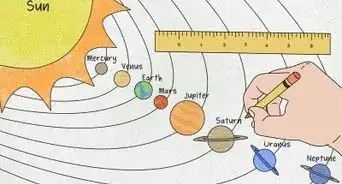This article was co-authored by wikiHow Staff. Our trained team of editors and researchers validate articles for accuracy and comprehensiveness. wikiHow's Content Management Team carefully monitors the work from our editorial staff to ensure that each article is backed by trusted research and meets our high quality standards.
There are 10 references cited in this article, which can be found at the bottom of the page.
wikiHow marks an article as reader-approved once it receives enough positive feedback. This article received 54 testimonials and 92% of readers who voted found it helpful, earning it our reader-approved status.
This article has been viewed 354,682 times.
Learn more...
Astronomy is the study of the stars, planets, and galaxies that make up our universe. It can be a challenging and rewarding career that could lead to amazing discoveries about the way space works. If you have a passion for the night sky, you can translate that into a career as an astronomer by getting good grades in physics and mathematics. You should then develop the skills and experience necessary to land a good professional position as an astronomer at an observatory or even a space agency like NASA.
Steps
Getting the Necessary Education
-
1Get good grades in high school physics, mathematics, and chemistry. Take regular and advanced classes in these subjects. Work hard and earn high marks in these classes, as this will give you a good foundation for the study of astronomy.[1]
- If you struggle to do well in these subjects, you may hire a tutor to help you get better grades. You can also join a study group to help you earn better marks in these subjects.
-
2Earn a bachelor’s degree in science, with a focus on astronomy or physics. Take a four year degree in science, majoring in astronomy or physics. This degree will teach you key skills and prepare you for a career as an astronomer.[2]
- Some universities will offer a degree specialization in astrophysics, which is a mix of astronomy and physics.
- Speak to an academic advisor for advice on which universities to apply to. You may apply to your local university or college. Or you may earn your degree in a university that is out of state or in a different city.
- Pick a university that offers a good bachelor’s program in science and good financial aid.
Advertisement -
3Get a master’s degree in science. Most astronomers have a master’s degree in science as well as an undergraduate degree. This degree can take at least two years to complete. Getting a master’s degree will allow you to take specialized classes on astronomy, physics, and math. You will also get a chance to do research in the field.[3]
- As part of your master’s degree, you will also write a master's thesis that explores a specific topic or idea in astronomy.
-
4Pursue a Ph.D in a particular area of astronomy. Doing a Ph.D gives you the opportunity to study a particular area of astronomy, such as radio, solar, cosmos, or galactic astronomy. You will need to take classes that cover a particular area of astronomy. This degree can take four to five years to complete.[4]
- There are many different areas of astronomy that you can study at the Ph.D level. Take the time to figure out what interests you, such as planets and moons, the cosmos, or the galaxies.
- As part of your Ph.D, you are usually given the opportunity to do internships and research fellowships in your particular area of study. This is a great way to gain work experience in the field.
-
5Complete your Ph.D dissertation and take the qualifying exams. To get your Ph.D, you will need to create a dissertation proposal. Your dissertation should provide a deep study of a particular topic in the field of astronomy. You will then need to write the dissertation, which can range from 80 to 100 pages. You will also need to take qualifying exams to graduate with a Ph.D.[5]
- The qualifying exams will vary depending on the program you are in. You usually have to write a paper and do an oral presentation to pass the exams.
- Examples of possible dissertation topics include exploring star formations, examining high mass planets, and analyzing radio pulsars.[6]
Developing the Skills and Experience
-
1Study the universe with a telescope. Get a telescope with a big aperture and a wide range of magnification so you can see the stars, the moon, and the galaxies in the universe. Study the universe with the telescope on a regular basis so you become familiar with the many celestial bodies in the sky.[7]
- Buy a telescope that fits your budget and needs. Telescopes can be expensive so you may work your way up to the type that you want.
-
2Join an astronomy club or society. Learn more about astronomy by joining an astronomy club at your school or an astronomy society in your area. This will allow you to meet others interested in astronomy and focus more on your goal of becoming an astronomer.[8]
- Ask your school counsellor for more information on the astronomy club at your school.
- Look for online astronomy clubs, where you chat with others online about astronomy.
- If you can't find a local astronomy club, start your own with some friends or peers.
-
3Learn how to use science-related software programs. Take a class on chemistry, physics, or mathematical software programs so you can become proficient at using them. You can also download science-related software programs onto your home computer and teach yourself how to use them.
- For example, you may learn how to use physics software like AIDA, Orbit-Vis, or the Mars regional atmospheric modeling system.[9]
-
4Get better at working in a team. Participate in class discussions at school or create a study group where you meet and work as a team on assignments. You could even join a sports team at school or be part of a dance group after school. You will need to be able to function well in a team to be an astronomer, as astronomers often work with their peers and other scientists on projects in the field.
-
5Improve your writing and public speaking skills. Astronomers do more than just stare at the sky all day. They also communicate their ideas and discoveries with their peers and the general public. You will need to write about your studies and be comfortable speaking to the public about them as well. Make sure you do well in your English and communications classes.[10]
- You can also take a public speaking class so you feel more at ease speaking to strangers or large groups of people.
Getting a Position as an Astronomer
-
1Look for a postdoctoral fellowship to be a competitive job candidate. If you earn your Ph.D in astronomy, you can qualify for research positions at a university. These positions allow you to gain work experience and focus on your area of expertise in astronomy. You can also try to turn your research position into a full time employment position.[11]
- You may need to move based on where you land a research position. You will need to be flexible and adaptable, willing to move as needed.
- This is a good option if you want to go into academia and become a professor of astronomy.
-
2Get a teaching position at a university. Become a professor of astronomy at the undergraduate or graduate level. Look for open positions at your local university or universities out of state. You will need at least a master’s degree or a Ph.D in astronomy to qualify to teach.
-
3Apply for open positions at an observatory. Another option is to apply to work at an observatory as the resident astronomer. Working at an observatory allows you to interact with the public. You can also curate exhibits on astronomy and write books about specific areas of astronomy as part of your job.[12]
- Look for local observatories in your area. You can also search for observatories in places you may want to live.
-
4Look for positions in the aerospace or computer science industry. Some people who study to be an astronomer end up working in these areas, especially if they do not want to work in academia. These positions may also be ideal if you’d prefer to work directly with other astronomers and scientists on projects.[13]
- Make sure you emphasize your schooling, your work experience, and your particular field of study when applying for these positions. You may also note how you would contribute to the aerospace or computer science industry as an employee.
-
5Apply for positions at a space agency. Working for a space agency may be ideal if you’d like to collaborate with other astronomers and scientists on the study of the universe. The biggest space agency in the United States is NASA. You may apply for positions at NASA, focusing on your area of expertise in astronomy.[14]
- You should focus on your passion for astronomy as well as your degrees and your high marks. You should also note how you would make a positive contribution to NASA as an astronomer.
Community Q&A
-
QuestionIs astronomy is a good field or not? Is there a high chance of an astronomy graduate getting a good and secure job?
 Community AnswerAstronomy is a good field if you have scientific and analytical skills. If you want the highest chances of getting a job, get a PhD in astronomy, as many organizations, such as NASA, require you to get the degree.
Community AnswerAstronomy is a good field if you have scientific and analytical skills. If you want the highest chances of getting a job, get a PhD in astronomy, as many organizations, such as NASA, require you to get the degree. -
QuestionI am 14. What efforts should I make to become an astronomer in the future?
 Community AnswerLearn about astronomy, math, and physics on your own to the extent that you can. But mostly, it's just a matter of getting the right formal education when you're older. Make sure you do well in high school so you can get into a good college. Then in college, you can study physics, astronomy, or a similar subject, and find a job as a research assistant or something similar to start building experience. Finally, you would go to graduate school and then hopefully become an astronomer.
Community AnswerLearn about astronomy, math, and physics on your own to the extent that you can. But mostly, it's just a matter of getting the right formal education when you're older. Make sure you do well in high school so you can get into a good college. Then in college, you can study physics, astronomy, or a similar subject, and find a job as a research assistant or something similar to start building experience. Finally, you would go to graduate school and then hopefully become an astronomer. -
QuestionWhat subjects should I study in tenth grade?
 Community AnswerYou'll want to study physics and math as much as you can, as those are the majority of what astronomers do. You can also pick up astronomy books or look up information about astronomy online.
Community AnswerYou'll want to study physics and math as much as you can, as those are the majority of what astronomers do. You can also pick up astronomy books or look up information about astronomy online.
References
- ↑ https://aas.org/faq/what-does-it-take-become-astronomer
- ↑ https://aas.org/faq/what-does-it-take-become-astronomer
- ↑ https://aas.org/faq/what-does-it-take-become-astronomer
- ↑ http://curious.astro.cornell.edu/about-us/146-people-in-astronomy/careers-in-astronomy/becoming-an-astronomer/902-what-kind-of-schooling-is-necessary-to-become-an-astronomer-intermediate
- ↑ https://grad.wisc.edu/current-students/doctoral-guide/
- ↑ https://zenodo.org/communities/astrothesis/?page=1&size=20
- ↑ https://skyandtelescope.org/astronomy-equipment/how-to-choose-a-telescope/
- ↑ https://nightsky.jpl.nasa.gov/club-map.cfm
- ↑ https://en.wikipedia.org/wiki/Category:Physics_software
- ↑ https://www.indeed.com/career-advice/careers/what-does-an-astronomer-do
- ↑ https://www.theguardian.com/money/2016/apr/14/how-do-i-become-an-astronomer
- ↑ https://www.theguardian.com/money/2016/apr/14/how-do-i-become-an-astronomer
- ↑ https://aas.org/careers/career-in-astronomy
- ↑ https://aas.org/careers/career-in-astronomy
About This Article
To become an astronomer, start by using a telescope to view the stars and galaxies so that you become familiar with them. You can also join an astronomy club at your school or online to learn more about the subject and meet other people who share your interest. Then, take advanced classes in physics and math to give you a good foundation for a career in astronomy. After high school, attend a 4-year university to get a Bachelor’s degree in science before going on to get a Masters or Ph.D in Astronomy. For advice on how to choose a postdoctoral fellowship based on your specific area of astronomy, read on!









































































